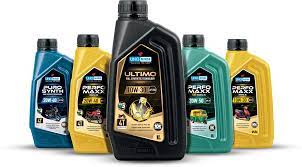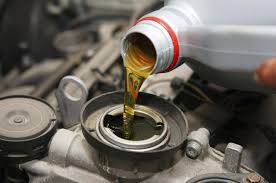Engine oil is often referred to as the "lifeblood" of a vehicle, and for good reason.
It plays a vital role in keeping your engine running smoothly and efficiently.
Whether you're a car enthusiast or just a regular driver, understanding the importance of engine oil is crucial for the longevity and performance of your vehicle.
In this comprehensive guide, we will dive deep into the world of engine oil, covering everything from its composition and types to choosing the right oil for your engine and maintaining it properly.
By the end of this article, you'll have a solid understanding of engine oil and be better equipped to take care of your vehicle.

Table of Contents:
1. What is Engine Oil?
2. The Composition of Engine Oil
3. Types of Engine Oil
4. Choosing the Right Oil for Your Engine
5. Engine Oil Viscosity Grade
6. Synthetic vs. Conventional Oil
7. The Importance of Regular Oil Changes
8. Engine Oil Additives
9. Common Myths and Misconceptions about Engine Oil
10. How to Properly Dispose of Engine Oil
11. Conclusion

What is Engine Oil?
Engine oil, also known as motor oil or lubricant, is a viscous liquid specifically designed to lubricate the internal moving parts of an engine.
It serves several critical functions, including reducing friction and wear, cooling the engine, preventing corrosion, and sealing gaps between components to maintain optimal compression.
The Composition of Engine Oil
Engine oil consists of a base oil and various additives.
The base oil can be derived from either mineral or synthetic sources, with synthetic oil offering superior performance and protection.
Additives are blended into the base oil to enhance its properties and ensure optimal engine performance.
Some common additives found in engine oil include:
- Detergents: These additives help clean the engine by preventing the accumulation of sludge and deposits.
- Dispersants: Dispersants prevent the formation of harmful deposits by keeping insoluble particles suspended in the oil, reducing the chances of clogging.
- Anti-Wear Additives:
- These additives form a protective film on the engine's metal surfaces, reducing friction and wear.
- Antioxidants: Antioxidants help prevent oil oxidation, which can cause the oil to degrade and form harmful sludge.
Viscosity Index Improvers: These additives help oil maintain its viscosity across a range of temperatures, ensuring optimal lubrication in both cold and hot environments.

Types of Engine Oil
There are several types of engine oil available in the market, each specifically designed to meet the requirements of different engines.
The two primary categories of engine oil are:
- Conventional Oil: Also known as mineral oil, conventional oil is derived from crude oil.
- It offers basic protection and lubrication properties but is less resistant to high temperatures and thermal breakdown.
- Synthetic Oil: Synthetic oil is chemically engineered and offers superior performance and protection compared to conventional oil.
- It is more resistant to high temperatures, thermal breakdown, and oxidation, making it ideal for high-performance and heavily-loaded engines.
Within these categories, you may also come across variations such as semi-synthetic oil, which is a blend of conventional and synthetic oils, offering a balance between cost and performance.
Choosing the Right Oil for Your Engine
Choosing the right oil for your engine is crucial to ensure optimal performance and protection. The first step in selecting the right oil is to refer to your vehicle's owner manual, as it provides manufacturer recommendations and specifications for engine oil.
Key factors to consider when choosing engine oil include:
- Viscosity Grade: The viscosity grade indicates the oil's flow characteristics at different temperatures. It is denoted by a two-number code, such as 10W-30, where the first number represents the oil's viscosity at low temperatures (W for winter), and the second number represents its viscosity at high temperatures. It's important to choose an oil viscosity grade recommended by the vehicle manufacturer for your specific engine.
- API Certification: The American Petroleum Institute (API) provides certifications for engine oils, indicating that they meet specific performance requirements.
- The API designation, such as API SN or API CK-4, ensures that the oil meets the minimum standards for engine protection, fuel efficiency, and emissions control.
- Look for the API certification recommended by your vehicle's manufacturer.
OEM Approvals:
Some vehicle manufacturers have their own oil standards and recommendations.
These OEM (Original Equipment Manufacturer) approvals indicate that the oil meets the specific requirements of the engine. Check if your vehicle manufacturer recommends any specific oil brand or specifications.
5. Engine Oil Viscosity Grade
The viscosity grade of engine oil plays a crucial role in determining its performance and suitability for different operating conditions. As mentioned earlier, the viscosity grade is denoted by a two-number code, such as 10W-30.
The first number before the "W" represents the viscosity rating at low temperatures, indicating how easily the oil flows when the engine is cold.
A lower number, such as 5W, indicates better flowability and cold-start protection in colder climates. On the other hand, a higher number, such as 20W, indicates thicker oil that may take a bit longer to flow during cold starts.
The second number represents the viscosity rating at high temperatures, indicating the oil's resistance to thinning out and maintaining adequate lubrication when the engine is hot.
A higher number, such as 30 or 40, signifies a thicker oil that maintains its viscosity and protects the engine under high temperatures.
It's important to choose the viscosity grade recommended by your vehicle's manufacturer, as they have designed the engine to operate optimally with a specific range of oil viscosities.
6. Synthetic vs. Conventional Oil
The debate between synthetic and conventional oil has been ongoing for years.
While conventional oil has been the go-to choice for many years due to its affordability, synthetic oil has gained popularity due to its enhanced performance and protection.
Synthetic oil offers several advantages over conventional oil:
- Better protection: Synthetic oil provides superior protection against friction, wear, and oxidation, thanks to its precisely tailored molecular composition.
- This makes it an ideal choice for high-performance engines and severe driving conditions.
- Extended oil change intervals:
- Synthetic oil has better resistance to thermal breakdown and oxidation, allowing for longer oil change intervals compared to conventional oil. This can save you time and money in the long run.
- Consistent performance:
- Synthetic oil maintains its viscosity and lubrication properties across a wider temperature range, ensuring consistent performance and protection in both extreme cold and hot conditions.
- Fuel efficiency: Synthetic oil's lower frictional properties and reduced viscosity can lead to improved fuel efficiency, ultimately saving you money at the pump.
However, it's worth mentioning that synthetic oil can be more expensive than conventional oil. If your vehicle manufacturer does not require synthetic oil, you can still achieve satisfactory performance and protection with a high-quality conventional oil.
